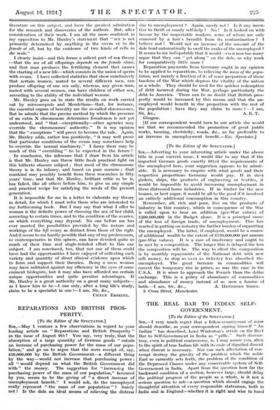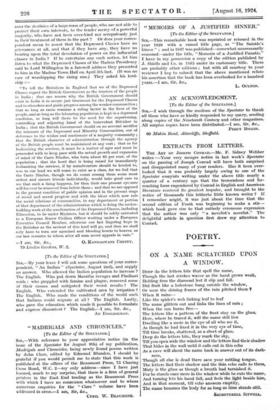THE REAL BAR TO INDIAN SELF- GOVERNMENT.
[To the Editor of the SPECTATOR.] SIR,—I very much regret that a fellow-countryman of mine should describe, as your correspondent 'signing himself "An Indian" has described, Lord Winterton's article on the Reel Bar to Self-Government in India as "piffle." Such discour- tesy, even in political controversy, is, I may assure you, alien to the spirit of true Indian life with its code of dignified dissent when dissent is necessary. Nor can such affectation of con- tempt destroy the gravity of the problem which the noble Earl so earnestly sets forth, the problem of the condition of the Depressed Classes under any conceivable system of Self- Government in India. Apart from the question how far the backward condition of a section, however large, should delay the political progress of the people as a whole, is it not a serious question to ask—a question which should engage the thoughtful attention of every responsible statesman, both in India and in England—whether it is right and wise to hand over the destinies of a large mass of people, who are not able to protect their own interests, to the tender mercy of a powerful majority, who have not been over-kind nor scrupulously just in their treatment of them in the pact? Or does your corres- pondent mean to assert that the Depressed Classes have no grievances at all, and that if they have any, they have no bearing upon the total devolution of power on the influential classes in India ? If he entertains any such notion, let him listen to what the Depressed Classes of the Madras Presidency said to Lord Willingdon in a farewell address they presented to him in the Madras Town Hall on April 5th last. (It was no case of worshipping the rising sun.) They asked his lord- ship :— " To tell the Britishers in England that we of the Depressed Classes regard the British Government as the trustees of the people in India ; that one reason why the British Government should exist in India is to secure just treatment for the Depressed Classes and to stimulate and guide progress among the weaker communities ; that so long as caste remains a ruling factor in the lives of the people, and so long as the labouring population is kept in a depressed condition, so long will there be the need for the supervening, controlling and adjusting hand of the benevolent Britisher in India ; that the British Government should on no account sacrifice the interests of the Depressed and Minority Communities, out of deference to the wishes and sentiments of a majority community ; that the British character of administration through the agency of the British people must be maintained at any cost ; that as for Indianizing the services, it must be a matter of ages and must be proceeded with to keep pace with the actual growth and expansion of mind of the Caste Hindus, who foam about 85 per cent, of the population ; that the howl that is being raised for immediately Indianizing the services, if by misadventure should be heeded to, woe to our land we will cease to exist as a class, for we feel that the Caste Hindus, though we do count among them some most ardent and sincere friends individually, would take good care to see that such a thing happens, for then their one present eye-sore will for ever be removed from before thorn; and that we are opposed in the present condition of public opinion and in the present stage of social and moral progress and with the ideas which now rule the social relations of communities, to any department or portion of that department of the administration which is doing the nation- building work of the amelioration of the Depressed Classes, including Education, to be under Ministers, but it should be solely entrusted to a European Senior Civilian Officer working under a European Executive Council Member, otherwise our last lingering hope in the Britisher as the saviour of this land will go, and then we shall only have to turn our agonized and bleeding hearts to heaven as our last resource to whom after all man never appeals in vain."
79 Linden Gardens, W. 2.



































 Previous page
Previous page